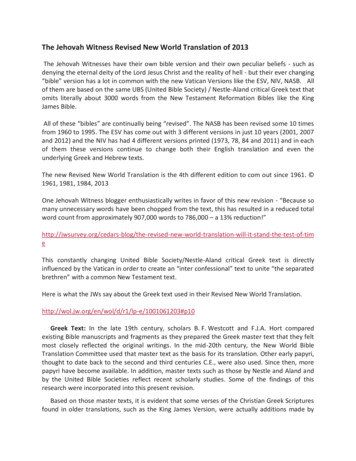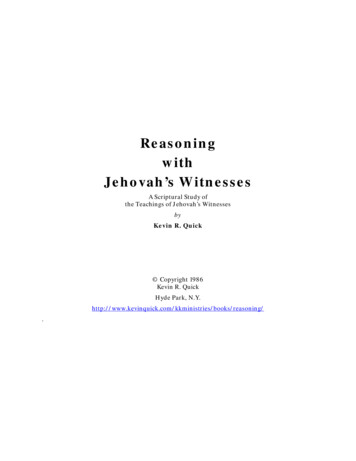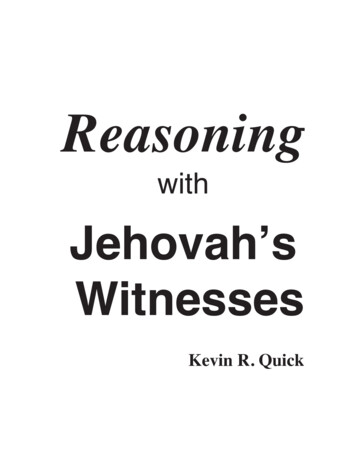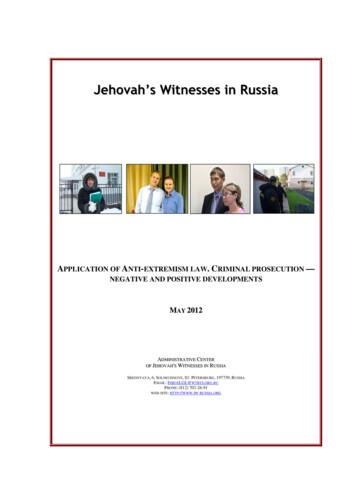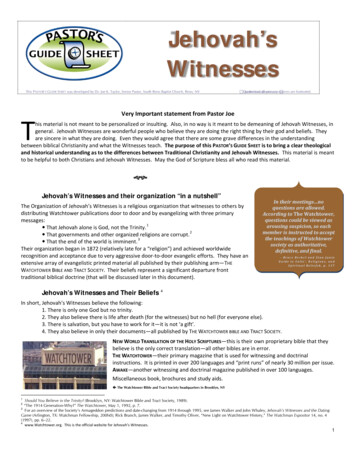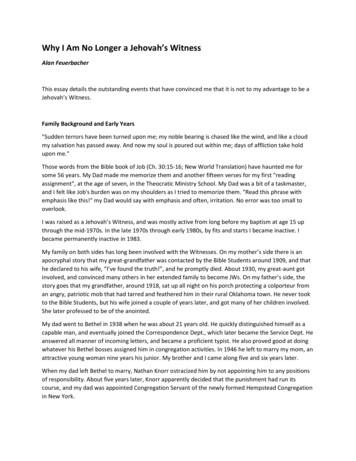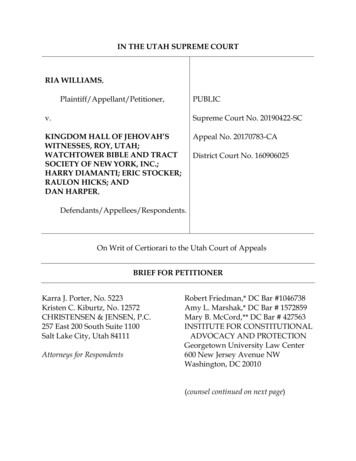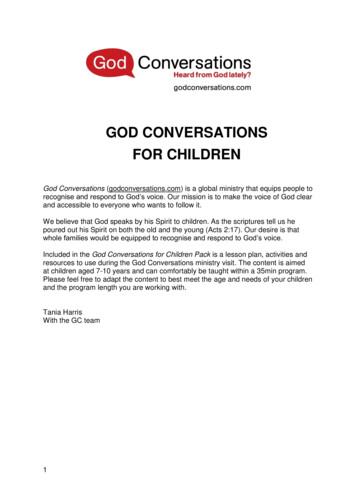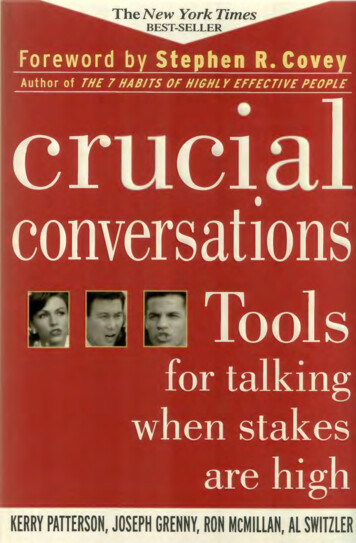
Transcription
Copyrighted materialConversations with Jehovah's Witnesses.indd 110/22/13 1:24 PM
Unless otherwise indicated, Scripture quotations are from The ESV Bible (The Holy Bible, EnglishStandard Version ), copyright 2001, 2011 by Crossway, a publishing ministry of Good News Publishers. Used by permission. All rights reserved.Verses marked nasb are taken from the New American Standard Bible , 1960, 1962, 1963, 1968, 1971,1972, 1973, 1975, 1977, 1995 by The Lockman Foundation. Used by permission. (www.Lockman.org)Verses marked niv are taken from the Holy Bible, New International Version , NIV . Copyright 1973, 1978, 1984, 2011, by Biblica, Inc. Used by permission of Zondervan. All rights reservedworldwide. www.zondervan.comVerses marked nkjv are taken from the New King James Version. Copyright 1982 by Thomas Nelson, Inc. Used by permission. All rights reserved.Verses marked hcsb are taken from the Holman Christian Standard Bible , Copyright 1999, 2000,2002, 2003 by Holman Bible Publishers. Used by permission. Holman Christian Standard Bible ,Holman CSB , and HCSB are federally registered trademarks of Holman Bible Publishers.Cover by Dugan Design Group, Bloomington, MinnesotaCover photo Design Pics / Don Hammond / Getty ImagesCONVERSATIONS WITH JEHOVAH’S WITNESSESCopyright 2014 by Ron RhodesPublished by Harvest House PublishersEugene, Oregon 97402www.harvesthousepublishers.comLibrary of Congress Cataloging-in-Publication DataRhodes, Ron.Conversations with Jehovah’s Witnesses / Ron Rhodes.pages cmIncludes bibliographical references.ISBN 978-0-7369-5142-5 (pbk.)ISBN 978-0-7369-5143-2 (eBook)1. Jehovah’s Witnesses—Controversial literature. 2. Witness bearing (Christianity)3. Apologetics. I. Title.BX8526.5.R555 2014289.9'2— dc232013015296All rights reserved. No part of this publication may be reproduced, stored in a retrieval system, ortransmitted in any form or by any means—electronic, mechanical, digital, photocopy, recording,or any other—except for brief quotations in printed reviews, without the prior permission of thepublisher.Printed in the United States of America13 14 15 16 17 18 19 20 21 22 / VP-CD / 10 9 8 7 6 5 4 3 2 1Copyrighted materialConversations with Jehovah's Witnesses.indd 210/22/13 1:24 PM
To my beloved wife, KerriCopyrighted materialConversations with Jehovah's Witnesses.indd 310/2/13 8:43 AM
AcknowledgmentsFew books are solo efforts. Most books involve a lot ofeffort not only from the authors but also from countlessother individuals. In different ways, an author’s work isimpacted by his interactions with his family, friends, professional colleagues, readers, and of course, the publisherwith its multiple departments. The more books I write, themore I sense my indebtedness to countless individuals inall these areas and more.Space constraints allow me to single out only a few. I remainforever thankful for my family—my wife, Kerri, and mytwo grown children, David and Kylie. I continue to begrateful to the fine folks at Harvest House Publishers—allcommitted Christians who are true professionals at whatthey do. Most of all, I express profound thanks and appreciation to our Lord Jesus Christ. What an honor it is to serveHim through the written word.Copyrighted materialConversations with Jehovah's Witnesses.indd 410/2/13 8:43 AM
ContentsIntroduction: Why Another Book on Jehovah’s Witnesses? . . . .7Part 1: The Basics of Tactical Conversing1. Why Effective Conversation Matters . . . . . . . . . . . . . . . . . .2. The Importance of Listening . . . . . . . . . . . . . . . . . . . . . . . .3. The Importance of Asking Questions . . . . . . . . . . . . . . . . .4. The Importance of Effective Redirection . . . . . . . . . . . . . . .5. The Importance of Avoiding Offense . . . . . . . . . . . . . . . . .6. The Importance of Speech Peppered by Grace . . . . . . . . . . .7. The Importance of Your Testimony . . . . . . . . . . . . . . . . . . .17253139475359Part 2: Conversations on the Big Issues8. Conversations About the Watchtower Society . . . . . . . . . . . 699. Conversations About the New World Translation . . . . . . . . 8310. Conversations About Jehovah . . . . . . . . . . . . . . . . . . . . . . . 9511. Conversations About Jesus and the Archangel Michael . . . . 10512. Conversations About Jesus and Jehovah . . . . . . . . . . . . . . . 11513. Conversations About Jesus’s Crucifixion . . . . . . . . . . . . . . . 12914. Conversations About Jesus’s Resurrection . . . . . . . . . . . . . . 13915. Conversations About Jesus’s Second Coming . . . . . . . . . . . 14916. Conversations About the Holy Spirit . . . . . . . . . . . . . . . . . . 15917. Conversations About the Trinity . . . . . . . . . . . . . . . . . . . . . 16918. Conversations About the Anointed Class and Other Sheep . . 17919. Conversations About Salvation . . . . . . . . . . . . . . . . . . . . . . 18920. Conversations About Soul Sleep and Hell . . . . . . . . . . . . . . 199Postscript: A Challenge . . . . . . . . . . . . . . . . . . . . . . . . . . . . . . . 209Bibliography . . . . . . . . . . . . . . . . . . . . . . . . . . . . . . . . . . . . . . . 213Notes . . . . . . . . . . . . . . . . . . . . . . . . . . . . . . . . . . . . . . . . . . . . . 217Copyrighted materialConversations with Jehovah's Witnesses.indd 510/17/13 9:02 AM
Copyrighted materialConversations with Jehovah's Witnesses.indd 610/2/13 8:43 AM
Introduction:Why Another Book onJehovah’s Witnesses?RThank you for your interest in this book!You may be aware that I have already written some books on theJehovah’s Witnesses. The first book I wrote on the subject was Reasoningfrom the Scriptures with the Jehovah’s Witnesses, weighing in at a whopping 464 pages. I later wrote a shorter treatment titled The 10 MostImportant Things You Can Say to a Jehovah’s Witness. This slimmeddown book is just 128 pages. For those who want the bottom line, Iwrote a 16-page quick reference guide entitled Jehovah’s Witnesses: WhatYou Need to Know.I’m grinning a bit as I write. The truth is, Ecclesiastes 12:12 justpopped into my mind. This verse says, “Of making many books there isno end, and much study is a weariness of the flesh.” So why on earth amI writing yet another book on the Jehovah’s Witnesses? Please believeme when I tell you that my goal is not to exhaust your body! To thecontrary, my goal is to actually make things easier for you as you continue to be a faithful missionary on your own doorstep when Jehovah’sWitnesses visit you.If you have read one or more of my earlier books on the subject,you will quickly see that this book is not intended to replace the earlierbooks, but to complement them. Here is the way I look at it. Reasoning from the Scriptures with the Jehovah’s Witnessesis a thorough treatment of what Jehovah’s Witnessesbelieve. It demonstrates precisely why their doctrines arewrong when measured against the Bible. I examine all the7Copyrighted materialConversations with Jehovah's Witnesses.indd 710/2/13 8:43 AM
8CONVERSATIONS with JEHOVAH’S WITNESSESprimary verses they cite to support their positions. I alsoinclude hundreds of questions you can ask to make yourpoints and to start good conversations. The 10 Most Important Things You Can Say to a Jehovah’s Witness provides a concise overview of their beliefs. It focuseson ten primary points you can make during dialogue. The quick-reference guide, Jehovah’s Witnesses: What YouNeed to Know, contains a brief 16-page listing of their primary doctrinal problems and the appropriate biblicalresponses. The present book demonstrates how to actually engageJehovah’s Witnesses in effective dialogue. It will show youthe right way to do it.The sample conversations in this book contain the verses that aremost likely to surface in dialogue with a Jehovah’s Witness. Of course,these conversations do not include every possible verse—that wouldbe impossible in a conversation-style, medium-sized book like this.In the interest of covering the most ground while being sensitive tobrevity, I have included conversations on representative verses, therebydemonstrating the basics of how to effectively dialogue with Jehovah’sWitnesses.If you desire to go deeper in a particular area, or if you desire full information on all the verses that could come up during dialogue, my comprehensive book Reasoning from the Scriptures with the Jehovah’s Witnesseswill be a big help to you. For your convenience, I have provided pagenumbers for supplemental reading at the end of each chapter in part 2.Tactical ConversationsThis book is intended to teach you how to engage in tactical conversations with Jehovah’s Witnesses that will yield maximum evangelisticpunch. Merriam-Webster’s 11th Collegiate Dictionary offers this as one ofthe definitions of “tactical”: “of or relating to small-scale actions serving a larger purpose.” The tactical conversations demonstrated in thisbook have the larger purpose of helping Jehovah’s Witnesses perceiveCopyrighted materialConversations with Jehovah's Witnesses.indd 810/2/13 8:43 AM
Introduction: Why Another Book on Jehovah’s Witnesses?9the error of Watchtower theology and become believers in the trueGod, the true Jesus, and the true gospel.When I was a teenager, many of my friends and I took a drivingclass at my high school. The teacher began by explaining the basics ofhow to operate cars—how to use the gas pedal, the brakes, the turn signals, the windshield wipers, the emergency flashers, and the like. All ofthis took place in a classroom setting.Imagine if the teacher then gave me some car keys, put me in a car,gave me two thumbs up, and said, “Go have a nice drive.” I might wellhave had an accident. This is why driving instructors provide on-thejob training in addition to classroom instruction. My teacher took meout on the road every day for three weeks, personally demonstratingeverything I needed to know in order to drive safely. By the end of thattime, I was ready to drive on my own.Learning to cook an omelet is much the same. A person can learna lot about making omelets by reading a cookbook. But it’s far better ifan experienced cook demonstrates the exact procedure—showing thenovice cook what he or she needs to know about the pan temperature,the right order for introducing each ingredient, how to flip the omeletin the pan, and the like. Personal training makes all the difference!Not all driving instructors teach the same way, and neither do allchefs. That does not mean one is wrong and the other is right. It simplymeans that their tactics are different. Both may have merit, and bothmight yield positive results. Similarly, my method of conversing withJehovah’s Witnesses is not the only method that can yield results. Godhas blessed the Christian church with many fine apologists, and we canlearn much from them. I’ve listed many of their books in the bibliography. I offer my approach with the hope and prayer that many Jehovah’s Witnesses will be delivered from the domain of darkness and findentrance into the kingdom of light (Colossians 1:13).The Difference Between Teaching and TrainingThere is a big difference between teaching and training. Christianauthor Kathi Hudson recounts a story told by her father that I thinkperfectly illustrates this difference.Copyrighted materialConversations with Jehovah's Witnesses.indd 910/2/13 8:43 AM
10CONVERSATIONS with JEHOVAH’S WITNESSESSince World War II, I’ve been a trained commercial pilotwith an instrument rating. Because of my good trainingand extensive experience, I could sit a young, 21-year-oldman in a classroom and teach him: FAA and Naval Regulations; navigation; aircraft ordinance; mechanical indoctrination; and radio procedures. He could pass all theexaminations just fine. He would have had good conscientious teaching.However, if I were to put him in a new jet fighter plane, pathim on the helmet and say, “Have a nice flight, son,” whatwould happen? It is likely he would crash and burn beforehe ever got off the runway. Why? He had good teachingbut NO TRAINING.Training always involves teaching, but teaching seldomincludes training. Teaching with actual flight trainingwould have saved the young pilot’s life and the 15 millionfighter plane. Training would ensure him of a good futurein flying To train this young man, I would take him onflights where I piloted, so I could model proper procedure. 1My goal in this book is to both teach and train you to engage ineffective conversations with Jehovah’s Witnesses. I will provide someon-the-job training by giving examples of conversations with Jehovah’sWitnesses. As you eavesdrop on these conversations, you will learn theins and outs of effective tactical conversations.Please note that the conversations I include in this book are notreal, but they are realistic. They are not actual transcripts of witnessingsessions I have had with Jehovah’s Witnesses. (Such would make forchoppy reading at best.) But the conversations are realistic in that I dealwith many of the actual issues that will most likely come up on yourdoorstep. I thoroughly demonstrate how to respond to such issues.Please also note that in each conversation I not only deal with theparticular issue they bring up, but I also take every opportunity toshow that the Watchtower Society, which claims to be the mouthpieceof Jehovah, is not a trustworthy source of truth. The more successfulCopyrighted materialConversations with Jehovah's Witnesses.indd 1010/2/13 8:43 AM
Introduction: Why Another Book on Jehovah’s Witnesses?11you are in chipping away at the doctrines of the Watchtower Societyin a kind but truthful manner, the more the Jehovah’s Witness will beopen to hearing what you have to say. This two-pronged approach—exposing errors in the teaching of the Watchtower Society and communicating biblical truth—is extremely effective.Biblically Based TacticsI intend to take a biblical approach in this book. I will cite lots ofScripture—not only in the sample conversations, which demonstratehow to refute the false views of the Jehovah’s Witnesses, but also whenI describe the methods I use to communicate truth to them. Scripturemust always be central. I encourage you to be like the Berean Christians of old, who tested the apostle Paul’s teachings against Scripture:“They received the word with all eagerness, examining the Scripturesdaily to see if these things were so” (Acts 17:11).Paul himself wrote, “Test everything; hold fast to what is good”(1 Thessalonians 5:21). Bible expositor Thomas Constable says Paul’sreaders “could do this by comparing what the speaker said with thestandard of previously given divine revelation (cf. Deut. 13:1-5; 18:20;1 John 4:1-3).” 2 Our goal, then, is to test all things against Scripture,which is our sole barometer of truth. By doing this, we can betterengage Jehovah’s Witnesses in helpful conversations.You Witness but God ConvertsIt is important that I remind you of a foundational truth. You and Iare called to be witnesses to the truth of the Bible (Matthew 28:19-20;Acts 1:8). We do not have the power in ourselves to convert anyone.That is God’s job. You and I witness; only our supernatural and miraculous God has the power to convert (see John 6:39-40,44).Many Christians throughout church history have noted the miraculous element involved in a fallen sinner converting to Christ. Baptistpreacher Adrian Rogers said that “the greatest miracle is the transformation that God works when he regenerates a soul.” 3 The Germanreformer Martin Luther commented, “Conversion is the greatest ofCopyrighted materialConversations with Jehovah's Witnesses.indd 1110/2/13 8:43 AM
12CONVERSATIONS with JEHOVAH’S WITNESSESall miracles.” 4 Henry Morris said that “the miracle of regeneration is agrade A miracle in every sense of the word.” 5Here is why I bring this up. You and I as God’s witnesses can beused as God’s instruments to communicate God’s transforming truthso that it eventually may lead to God’s supernatural conversion of alost soul (such as a Jehovah’s Witness). Knowing that it is God’s job todo the converting takes the weight off of you and me in our witnessingencounters. Following our faithful witness, we leave the results withGod. If the Jehovah’s Witness with whom we are speaking does notconvert, we can rest in the comfort of knowing that we have been faithful witnesses and that the results are in God’s sovereign hands.Perhaps a gardening metaphor might help. Some of us plant seedswhen we share the gospel. We may be the first to share the true gospel with a particular Jehovah’s Witness. Others of us water the seedthat has already been planted in the heart of the Jehovah’s Witness.We do this by continuing to share the truth of God’s Word with him.Others of us, fewer in number, experience the joy of seeing the flowerblossom—that is, we are privileged to see him become a true believerin Christ by the power of God.So don’t become discouraged if you don’t see an immediate conversion after your dialogue with the Jehovah’s Witness. Just focus on beingfaithful in planting and watering the seed. It is then in God’s sovereignhands. As the Christian singer Keith Green once said, “Do your best,pray that it’s blessed, and the Lord will take care of the rest.”Charting Our CourseThis book is divided into two parts. Part 1 contains seven chaptersthat deal with the basics of tactical conversing. Here I lay a foundationfor you. What you learn in these seven chapters will prove useful in witnessing to Jehovah’s Witnesses and anyone else who is not a Christian.Part 2 builds on part 1 by providing specific insights on conversingwith Jehovah’s Witnesses on important doctrinal issues, such as God,Jesus, the Holy Spirit, the Trinity, the gospel that saves, and the afterlife.In each chapter, I contrast what Jehovah’s Witnesses believe on a particular issue with what the Bible teaches. I point you to specific issues toCopyrighted materialConversations with Jehovah's Witnesses.indd 1210/2/13 8:43 AM
Introduction: Why Another Book on Jehovah’s Witnesses?13watch for, and I summarize “Important Points to Introduce.” Then Iget to the heart of the chapter—“Eavesdropping on a Conversation.” Ibring up Scripture references that are likely to surface in the conversation. Following sample conversations, I provide some very brief “Conversation Highlights,” in which I remind you of key components of myconversation. By using this simple methodology, my goal is to equipyou to become a confident missionary on your own doorstep.There is one more thing. You will notice that at the beginning ofeach chapter in part 2, I remind you to pray what I call the openthe-heart prayer. No such prayer is actually referenced in the Bible.However, I based my idea on Acts 16:14. According to this verse, abusinesswoman named Lydia was listening to the apostle Paul speak,and “the Lord opened her heart to pay attention to what was said byPaul.” Every time a Jehovah’s Witness rings your doorbell and youbegin a conversation, silently pray that the Lord would open his or herheart to pay attention to what you have to say. Remember—only Godhas the power to convert.Father, I pray that by the power of the Holy Spirit, You willenlighten the understanding of my readers so that they can fullygrasp how to most effectively communicate the good news of thegospel to Jehovah’s Witnesses. Please remove any fears they mayhave about witnessing encounters. Grant them Your peace asthey share the good news. May our combined efforts lead tomany Jehovah’s Witnesses becoming believers in the true Messiah, Jesus Christ. Amen.Copyrighted materialConversations with Jehovah's Witnesses.indd 1310/21/13 11:33 AM
Copyrighted materialConversations with Jehovah's Witnesses.indd 1410/2/13 8:43 AM
Part 1The Basics of Tactical ConversingCopyrighted materialConversations with Jehovah's Witnesses.indd 1510/2/13 8:43 AM
Copyrighted materialConversations with Jehovah's Witnesses.indd 1610/2/13 8:43 AM
1Why Effective Conversation MattersRAdvice columnist Abigail Van Buren once commented, “In myview, the height of arrogance is to attempt to show people the‘errors’ in the religion of their choice.” 1 Her thinking implies a commandment—“Thou shalt not infringe upon my religious truth.” Ofcourse, if we heeded Van Buren’s advice, apologetic conversations withJehovah’s Witnesses (and others) would never take place, and countless souls would enter eternity without having heard the gospel of JesusChrist.Tragically, some Christians avoid dialoguing with Jehovah’s Witnesses for other reasons. Some are fearful of engaging in such dialogue.Others are too busy with their own plans for the day. Still other Christians rationalize that Jehovah’s Witnesses follow the “devil’s religion”and should be treated accordingly. Some Christians even slam the doorin the face of Jehovah’s Witnesses.The problem with the last of these responses is that it ends up re- inforcing, in the minds of Jehovah’s Witnesses, their claim to be thetrue people of God. Just as God’s people were mistreated and persecuted in Old and New Testament times, so the Jehovah’s Witnessesclaim to be the persecuted people of God today. They believe they aremodern martyrs in a long line of victims throughout history. Christianapologist Wilbur Lingle reports, “I have been to their Kingdom Hallsand heard them sing a song about going from door to door and howpeople will slam the door in their faces—but they will be ‘true to Jehovah because they are receiving persecution for his sake.’ ”2My best advice is to always be willing to converse with Jehovah’sWitnesses whenever they show up on your doorstep, and to do it with17Copyrighted materialConversations with Jehovah's Witnesses.indd 1710/21/13 11:33 AM
18CONVERSATIONS with JEHOVAH’S WITNESSESkindness and respect (see 1 Peter 3:15-16). Never forget that God willuse you as His instrument to reach the lost. This book will help you tobe prepared.A Kingdom AssignmentThroughout biblical history and to this day, God has chosen toreach people through other people. For example, God chose the Jewsto be a light for the nations and appointed them to share the good newsof God with all other people around the world (see Isaiah 42:6). TheJews were to be God’s representatives to the Gentiles. The Jews failed atthis task and didn’t even recognize Jesus as the divine Messiah. Never theless, this was their divine calling.Among the Jews themselves, the priests were called to representGod to the people and to represent the people to God (Exodus 30:10).God employed the priests as intermediaries to maintain His relationship with the Jewish people.All the while, the Old Testament prophets were on the scene, oftenbeginning their revelations from God with “Thus says the Lord” (asin Exodus 4:22, for example). They communicated God’s revelationto the people as God spoke through them. Then, in New Testamenttimes, God communicated His revelations to people through the apostles (see Acts 4:33).Today, God calls Christian churches and individual Christians tobe His representatives in sharing the good news of the gospel with otherpeople throughout the world (Matthew 28:19-20; Acts 1:8). Just as Hedid in times past, God today works through people in making Himselfknown to people. This has always been His modus operandi.The relevance of this fact for witnessing to Jehovah’s Witnesses isobvious. You and I as Christians are God’s representatives, empoweredto communicate the truth of Scripture to those we encounter, including Jehovah’s Witnesses. Never forget that God reaches people throughHis own people. For this reason, when Jehovah’s Witnesses show upon our doorstep, we can know that God is giving us a kingdom assignment. Do we dare say no?Copyrighted materialConversations with Jehovah's Witnesses.indd 1810/2/13 8:43 AM
Why Effective Conversation Matters19Goal-Driven ConversationsWhen conversing with Jehovah’s Witnesses, we engage in goaldriven conversation. Our goal is to help them become truly informedabout Watchtower theology. We want to provide information thatleads them to the true God, the true Jesus, and the true gospel thatsaves. As one Christian apologist put it, “The ultimate goal of a Christian conversing with a Jehovah’s Witness should be to lead him to personal faith in our wonderful Lord and Savior Jesus Christ.”3There is a strong precedent in Scripture for using the spoken wordto persuade men and women to accept God’s truth. The apostle Paulinstructed young Timothy about this.I charge you in the presence of God and of Christ Jesus,who is to judge the living and the dead, and by his appearing and his kingdom: preach the word; be ready in seasonand out of season; reprove, rebuke, and exhort, with complete patience and teaching (2 Timothy 4:1-2).Church leaders are required to “hold firm to the trustworthy wordas taught, so that [they] may be able to give instruction in sound doctrine and also to rebuke those who contradict it” (Titus 1:9). Paul himself loved to reason from the Scriptures with people.Paul went in, as was his custom, and on three Sabbath dayshe reasoned with them from the Scriptures, explaining andproving that it was necessary for the Christ to suffer and torise from the dead, and saying, “This Jesus, whom I proclaim to you, is the Christ.” And some of them were persuaded and joined Paul and Silas, as did a great many ofthe devout Greeks and not a few of the leading women(Acts 17:2-4).Of course, apostles and church leaders were not the only ones toengage in goal-driven conversations with people. We have seen thatyou and I, too, are called to be engaged in the evangelistic process.Copyrighted materialConversations with Jehovah's Witnesses.indd 1910/2/13 8:43 AM
20CONVERSATIONS with JEHOVAH’S WITNESSESAlways Be Ready with an AnswerFirst Peter 3:15-16 is foundational to our tactical strategy in witnessing to Jehovah’s Witnesses. “Set apart the Messiah as Lord in yourhearts, and always be ready to give a defense to anyone who asks youfor a reason for the hope that is in you. However, do this with gentleness and respect, keeping your conscience clear” (hcsb). Let’s brieflyexamine the key components of this passage.Honor the Messiah Jesus as Lord in Your HeartsEach of us must honor Christ as Lord in our hearts. He is oursovereign Master. When we are in full submission to the lordship ofChrist, we think about our conversations with Jehovah’s Witnesses innew ways. We recognize that Christ is in charge. When witnessingto a Jehovah’s Witness, we are fulfilling the Great Commission. We recognize that Christ is in charge of the outcome of theconversation. We must not forget that our job is simply tospeak about the truth of Scripture and that it is God’s jobto convert. This takes the burden off of us in witnessingencounters. Because Christ is in charge, we need not have any fearabout the witnessing encounter (see Psalm 118:6; Hebrews13:6). As one commentator put it, “To reverence Christ asLord means to believe that Jesus Christ is in control andthat those who come against the believer are not. To havesuch reverence is to maintain a deep-seated confidencein Jesus Christ as the reigning Lord of the universe.”4 Putanother way, “our fear of the Lord should drive out all fearof men.”5 So don’t sweat it when you converse with Jehovah’s Witnesses. The Lord is with you. Share the truth inpeace.Copyrighted materialConversations with Jehovah's Witnesses.indd 2010/21/13 11:33 AM
Why Effective Conversation Matters21Be Ready to RespondDo you have an eternal hope that is plainly evident to all those youmeet? Or are you more like a secret-agent Christian who has neverblown his cover?The truth is, only people who become aware that you have an eternal hope will ask you about it. My exhortation, then, is that we shouldall be open and free about our hope in Jesus Christ. Especially whenJehovah’s Witnesses show up on the doorstep, we ought to speak insuch a way that they quickly perceive that we are truly excited about oureternal hope. Don’t mask it. Don’t camouflage it. Be a shining light—a sparkling diamond—so that they can see that something is differentabout you (Matthew 5:16). As one Bible scholar put it, “Christian hopeis to be so real and distinctive that non-Christians will be puzzled by itand ask for an explanation.”6When someone asks us about our eternal hope, we need to be readywith an answer, as 1 Peter 3:15-16 instructs. Bible expositor ThomasConstable says, “We should have the reason we are living as we do onthe tip of our tongues so whenever an opportunity arises we can explainwhy we behave as we do (cf. Acts 22:1; 25:16).”7Once they ask us, we can make our defense. The word “defense” inthis verse comes from the Greek word apologia, from which we derivethe English term “apologetics.” In New Testament times the term wasoften used of a formal legal defense in a court of law (see Acts 25:16;2 Timothy 4:16).8 The apostle Paul adapted the term in regard todefending the truth of Christianity (see Philippians 1:16).Always Use Gentleness and RespectPeter reminds us to make our defense of the truth with gentlenessand respect. These words are rich in meaning. The word “gentleness”carries the idea of meekness and humility. There is not to be even theslightest hint of arrogance (see 1 Peter 3:4). This does not mean thatthe Christian defender is to seem weak or hesitant, but rather thathe or she is to communicate strong truth from the Bible in a gentle and humble way. The Christian should certainly not ram truthCopyrighted materialConversations with Jehovah's Witnesses.indd 2110/2/13 8:43 AM
22CONVERSATIONS with JEHOVAH’S WITNESSESdown people’s throats, speak patronizingly, act condescendingly, orhave a critical countenance. Let’s not forget that soft answers are themost effective because they “turn away wrath” (Proverbs 15:1). A gentle answer is much easier to swallow.The word “respect” has two
Jehovahs’ Witnesses. The first book I wrote on the subject was Reasoning from the Scriptures with the Jehovah’s Witnesses, weighing in at a whop - ping 464 pages. I later wrote a shorter treatment titled Most The 10 Important Things You Can Say to a Jehovah’s Witness. This slimmed-down book
